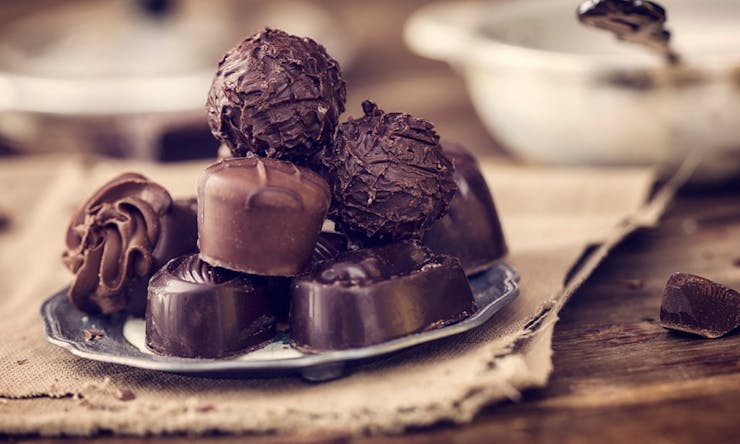Cannabis and chocolate: two substances with the power to make people very happy. Few things make for a better pair, and between the thousands of cannabis strains and a similar range of chocolate origins and options, the possibilities are endless. But how to go about pairing your favorite chocolate bars, truffles and desserts with your favorite strains? Don’t be intimidated by pairings – they’re easier than you think.
What Makes Cannabis Go So Well with Chocolate?
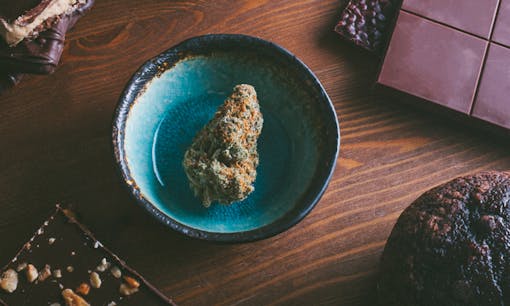
“There are so many parallels between chocolate and cannabis,” says Claire McKenzie, a Seattle-based professional chocolatier who offers chocolate and cannabis tasting and truffle-making workshops through her company, E’Claire Chocolates. “Chocolate is a plant just like cannabis, with three types of cacao similar to how there are three types of cannabis,” McKenzie explains. The effects of eating chocolate are in many ways chemically similar to the effects of consuming cannabis. Cacao beans even produce a kind of cannabinoid of their own – anandamide – which binds to the same receptors as THC in the brain, and mimics the pleasant feelings that cannabinoids catalyze.
What happens when you bring chocolate and cannabis together? “When there’s the THC and anandamide and theobromine and CBD coming together…you get that elevated, jazzed-up feeling” as the influences interact with one another, says McKenzie. Since cannabis tends to heighten the enjoyment of taste and texture, it’s especially easy to get excited about chocolate’s flavor profiles when you’re under the influence of cannabis. And the best part is that both chocolate and cannabis are good for you. “If you eat whole chocolate it’s the best food in the world,” McKenzie says, referring not only to chocolate’s natural mood enhancing properties but also to its numerous minerals and antioxidants. “The only thing that can make chocolate better is cannabis.”
The Basics of Chocolate Tasting
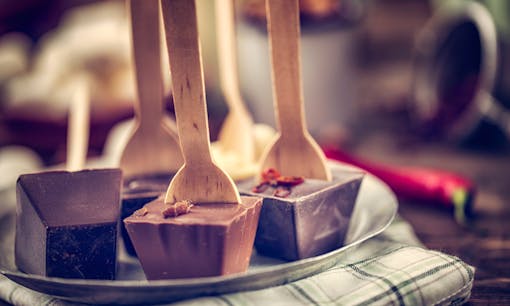
Pretty much everyone loves chocolate, but we often eat it without actively thinking about what we’re tasting (beyond “chocolatey” and “delicious”). In fact, chocolate is among the most flavorful foods on Earth, and can display a wide range of nuances depending on the type of bean, growing location, soil, altitude, environmental conditions, when the beans were harvested, how they were processed, and so on. Chocolate from Madagascar can display tart or sour fruit characteristics; Hawaiian chocolate often exhibits nutty and caramelly notes; some Southeast Asian chocolate can reveal earthy, smoky flavors.
Chocolate tasting is about more than just flavor. Before you eat a chocolate, consider its appearance, then bring it to your nose and take a few deep breaths, inhaling its aroma. Pop the chocolate in your mouth and let it melt on your tongue rather than biting it. Evaluate the texture. Think carefully about what you’re tasting, and try to come up with descriptors (you’ll get better at this with practice). Do you detect tobacco? Dried fruit? Butterscotch? Hazelnut? If you’re having a hard time, use a chocolate flavor wheel to get the ideas flowing. Be sure to keep thinking about the taste even after you’ve swallowed the chocolate: unique flavors often show up in the finish. Take notes as you do all this, and think about flavors that might complement what you’re tasting.
The Basics of Cannabis Pairing
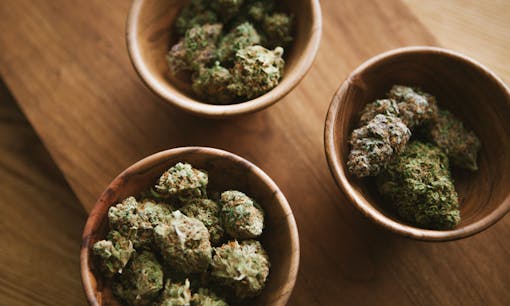
No matter what you’re matching it with, the right cannabis pairing starts with an understanding of cannabis terpenes – the compounds that occur in varying concentrations to give individual cannabis strains their unique aromas and flavors. Limonene is what gives Lemon Skunk its distinctive zestiness; a high concentration of pinene imparts a foresty flavor profile to Jack Herer. Matching these aroma and flavor profiles with other aromas and flavors that complement or accentuate them is what makes for a great pairing.
If you’re a beginner, cannabis strains with high terpene levels are a great place to start; they’ll have the most pronounced aromas and flavors, which make them easier to match. Your budtender will be able to guide you toward strains with high levels of terpenes (between 2% and 4% total terpene content is generally considered high).
How best to consume the cannabis? Vaping flower is one of the best options because it lets terpene flavors shine through. Vaping concentrates can be similarly enjoyable, though be aware that concentrated flavor may overwhelm the taste of some chocolates. Smoking a bowl or joint will work too; you’ll get less of the strain flavor, which can make pairing harder, but the smoke adds a flavor element of its own that goes well with certain chocolates, especially dark ones.
Cannabis and Chocolate Pairings to Start With
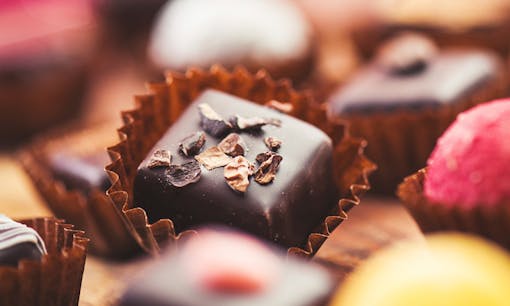
Ready to pair? We recommend picking out three unique types of chocolate (such as white, milk and dark chocolate, or three dark chocolates from different origins) and three strains with very different flavor profiles (try a bright citrusy strain, a sweet fruity strain, and a pungent skunky strain). When sampling, either take a hit before taking a bite of chocolate, or place a piece of chocolate on your tongue and let it melt for a few seconds before taking the hit as you savor it. Try each strain with each type of chocolate. Which combinations do you like best?
It’s important to remember that there are no right or wrong answers in pairing: if you like the combination, then it’s a good match. Everyone tastes things differently based on past experiences, personal preferences, and even genetics, so what delights one person may seem lackluster to someone else. The more you sample, the better you’ll get at determining what you like.
To get started, try these three combinations:
White Chocolate and Super Lemon Haze: If it sounds like it would make a delectable dessert (think lemon white chocolate cheesecake), chances are it’ll be a solid pairing. That was the case with a rich white chocolate plus a pungent Super Lemon Haze from Rootworx in Shelton, Wash.; the lemon characteristics cut straight through the rich sweetness of the white chocolate.
Milk Chocolate and Marionberry Kush: We matched a 38% milk chocolate with a sweet, juicy Marionberry Kush from Emerald Jane’s in Seattle. Look for a fruity Central American chocolate for this pairing, and pay attention to how it brings out the jammy notes in the strain.
Dark Chocolate and GG4: The pungent diesel aromas of North Coast Growers’ GG4 added a surprising degree of complexity to the roasty, bitter dark chocolate we tried. An earthy South American chocolate that clocks in around 70% cacao works beautifully for this pairing.
What are your favorite chocolate and cannabis pairings? Share them in the comments section below!
Image Source: Sara Dilley
